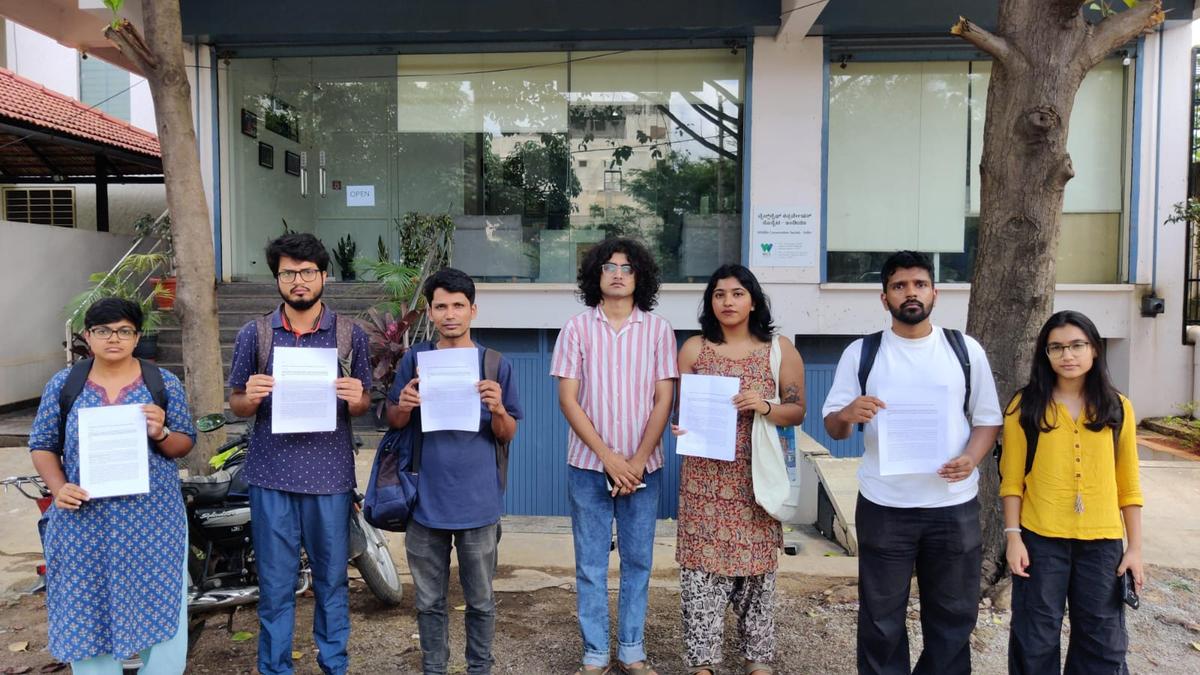
The letter expressed solidarity with the 52 families of Karadikallu who have been demanding the recognition of their forest rights.
| Photo Credit: Special arrangement
Several citizen groups came together to release an open letter in front of the Wildlife Conservation Society office in Bengaluru expressing concern regarding the ongoing tensions inside the Nagarahole Tiger Reserve.
The letter expressed solidarity with the 52 families of Karadikallu who have been demanding the recognition of their forest rights. The signees of the letter condemned ‘the historical violence and threats the communities continue to face in the name of conservation.’ They termed the actions of the Forest Department ‘deliberate attempts to deny the communities their rights’.
‘Anti-people and anti-environment’
On June 18, 2025, around 250 Forest Department officials, with the police personnel and armed special tiger task force members, demolished six makeshift huts of the Jenukuruba tribal families in Karadikallu. This was following the re-entry of the tribals into the forests of Nagarahole Tiger Reserve in May 2025 ‘to reclaim their ancestral land’.
The Jenukurubas have been in a long-drawn dispute with the Forest Department officials who, according to them, have repeatedly rejected their claims under the Forest Rights Act.
“Underlying these actions is a model of conservation witnessed in Nagarahole over the past decades, touted nationally and globally as a ‘successful model’, led by organisations like Wildlife Conservation Society (WCS) and prominent conservationists Ullas Karanth, Krithi Karanth, late K.M. Chinappa, that is viciously anti-people and anti-environment,” read the letter, which alleged that the model has turned Nagarahole into a militarised conflict zone.
“Fact-finding missions and widespread documentation on media and social media highlight that ‘forest conservation’ in forests like Nagarahole has come to mean violence, militarisation, persecutional AI-based, and digital surveillance, forced evictions, displacement and deprivation for the tribal and other vulnerable forest communities who have lived and nurtured the forests for centuries,” it further said.
‘Criminalising natives’
The letter said that several portions of the forest have been replaced by timber plantations, and eco-tourism has been popularised to allow entry of tourists and resorts into the forests, while denying tribals their customary rights. It also noted that the conservation model criminalises local forest communities by terming them ‘encroachers’.
“It has been widely documented that what is termed by the WCS and the Forest Department as ‘voluntary relocations’ is anything but that… while conservationists like Chinnappa seek to minimise human interference in the forest to restore biodiversity, the latest science shows that lands managed by indigenous communities tend to be the most biodiverse, more than areas managed under ‘wildlife reserves’ or ‘protected areas’,” it said.
The letter has been signed by the representatives of Community Network Against Protected Areas, Fridays For Future, All India Students’ Association Karnataka, and Peoples’ Union for Civil Liberties, among others.
Published – July 17, 2025 09:16 pm IST





















